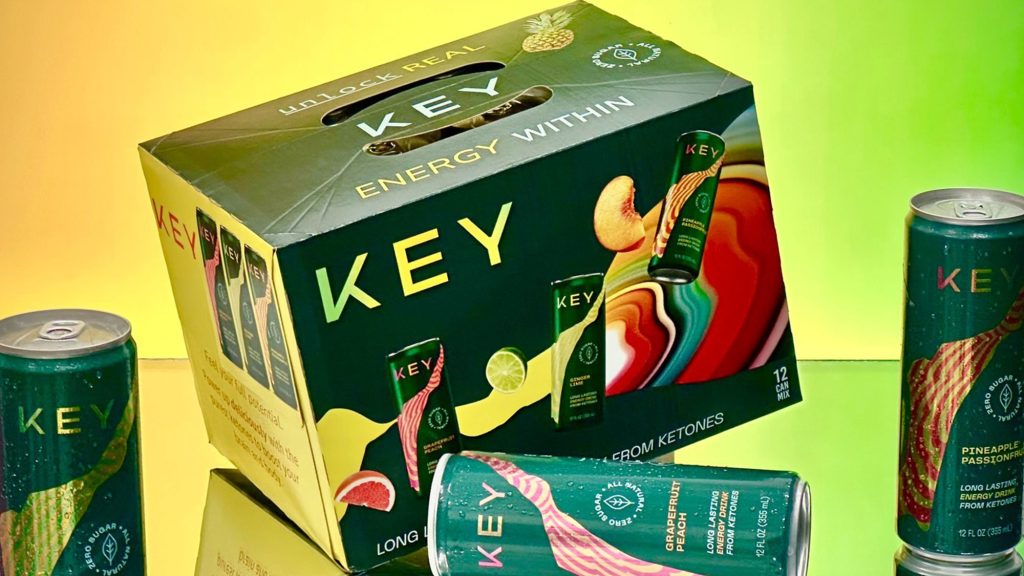Former Coca-Cola and PepsiCo executives are teaming up on a new beverage venture: KEY, a ketone-focused energy drink. The beverage, which launched Wednesday, claims to be an all-natural product that “harnesses the power of ketones,” according to a press release from the brand.
The latest entry into the rapidly-growing energy drinks category has already raised a seed round of $4 million, led by AgFunder, a leading food-and-agriculture tech investment fund. KEY is launching with three flavors (Pineapple Passionfruit, Grapefruit Peach, and Ginger Lime) which are available through the brand’s site, Amazon, and unsurprisingly, at California wellness hub Erewhon.
The company clearly has no qualms about making far-reaching health claims, asserting that KEY will revolutionize the space with a “clean” source of energy. The company claims the formula, sold in 12-ounce cans, will “deliver long-lasting smooth energy” and provide “dose-dependent advantages such as improved cognitive benefits, appetite suppression, metabolic health and enhanced recovery,” as stated in the release.
The KEY website and press release both notably lack a reliable scientific source to back these claims, but instead include personal anecdotes from the founders and investors.
“The first time I tried ketones, I was blown away by the long-lasting energy, the euphoric feeling and the mental focus I felt,” co-founder Karishma Thawani says in the release. “I cannot wait for everyone to experience KEY to tap into their full potential.”
Manuel Gonzalez, general partner at AgFunder adds: “When I saw KEY, I thought, this is not possible, all-natural, no sugar, no caffeine… how can this be? Well, it so happens that ketones activate our own body’s ability to make energy. Ketones and green tea are my new mantra.” (The product’s ingredient list does, in fact, include caffeine from green tea.)
While a low-sugar energy drink sounds all well and good, the science behind KEY’s ingredients remains unclear, though it’s positioned to support a ketogenic diet. In simple terms, the “keto diet” is a high-protein, high-fat, and low-carbohydrate eating plan that aims to achieve ketosis, a state during which the body switches from relying on glucose for energy to relying on ketones, a chemical compound your liver creates. This state often occurs in cases of long-term fasting or starvation. This diet has received a lot of buzz in certain circles of diet culture due to its association with rapid weight loss, but the questionable long-term effects make it highly controversial.
Studying KEY’s ingredient list — which includes “11.5g AvelaTM Pre-Ketones, Natural Green Tea Caffeine, Natural L-Theanine, Natural Stevia Sweetener, [and] Natural Flavors” — it’s notable that the drink’s active ingredient isn’t a known ketone supplement, but a seemingly new product. The release states: “Unlike the synthetic ketones found in supplements today, KEY uses pure active natural ketones made using fermentation,” but fails to elaborate on the compound and how they retrieve it.
In terms of whether or not this drink will support a state of ketosis, there’s only one study testing the impact of these AvelaTM ketones on blood ketone levels, which was conducted on 26 participants who underwent an overnight fast. The study was funded by Genomatica, the company behind the Avela product. Regardless of backing, the study itself still doesn’t prove that consuming the beverage will put your body into “ketosis” in the long-term, especially if you continue to eat carbs while drinking them.
The long-term effects of the ketogenic diet have yet to be fully elucidated by the scientific community, and associated risks include vitamin and mineral deficiencies, a lack of fiber leading to digestive side effects, interference with normal kidney function, and a higher risk of heart disease. Plus, an overload of ketone bodies can lead to ketoacidosis, a severe condition typically associated with diabetes. While the KEY packaging fails to address any of these issues, the website does state that customers should consume no more than three cans a day.
Although this ketone-focused approach could potentially pose a hazard to consumers, that’s just par for the course in the current energy drinks market. Though the $20 billion energy drink category is growing at a rapid rate, it continues to be one of the most unregulated and dangerous for consumers. In addition to exposing people to unsafe levels of caffeine, these beverages can be filled with unstudied compounds with unknown health effects. Just this month the Southern District of New York filed a class action lawsuit against Prime Hydration LLC, the energy drink brand backed by YouTubers Logan Paul and KSI, for “misleading and deceptive practices,” as the drink was found to have higher caffeine content than advertised and potentially harmful PFAs (synthetic chemicals).
The article This New ‘Ketone’ Energy Drink Is…Something appeared first on VinePair.
